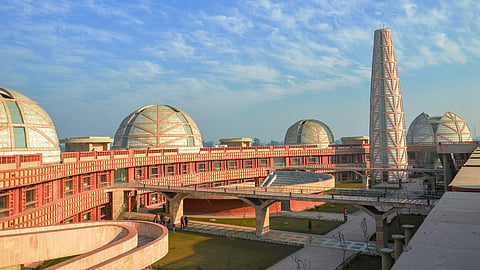

When Independence Day comes, nothing can pay warmer tribute to freedom fighters in Punjab than a trip to the Gothic memorials of the state. These places represent amazing sacrifice and the tales of love and hope behind them inspire one to remember the cost of freedom every moment.
The Jang-e-Azadi memorial situated in Kartarpur is a significant part of Punjab's history and the enduring struggle of countless Indians, including Pujabis, for India's freedom. The memorial plan involves developing a cpmprehensive memorial complex for freedom fighters across 25 acres near Kapurthala.
The prioject is estimated to cost ₹ 315 Cr. The memorial now an an institue to educate the youth about the state's culture. The state government has carefully chosen the location along the Jalandhar-Amritsar national highway to ensure easy acess for tourists.
Besides being a traditional memorial, the Wagah Border is also a symbol of an intense sense of nationalism in that it is the site of the popular daily flag-lowering ceremony. At celebrations of Independence Day, Indian and Pakistani border troops stage energetic performances of drone and flag soldier choreography, and the whole site resounds with an extremely nationalistic fervor, reminding spectators of ceaseless watchful vigilance one has to keep to be able to enjoy freedom.
Partition Museum contains as a storehouse of forty seven artifacts, photographs and oral testimonies of the painful and heartbreaking experience of partition which is a poignant reminder of India's independence trauma and resilience. Partition provides those who visit it with a somber but telling glimpse of freedom's price tag and the indomitable will of the enduring human spirit to reconstruct shattered lives.
Existing today as a symbol for the breathtaking acts of gallantry and valour for which Punjab is known, Gobindgarh Fort, which was one of the foremost military forts in India, now features numerous museums as well as light and sound displays, and serves as the location for other cultural showcases. It is done to commemorate the courage of the Punjab fighters in the scenario of the Indian freedom struggle, specifically the efforts of and sacrifices which India made in order to achieve independence.
The prominent Jallianwala Bagh is a historic garden and memorial of national importance close to the Golden Temple complex in Amritsar, Punjab, India, preserved in the memory of those wounded and killed in the Jallianwala Bagh Massacre that took place on the site on the festival of Baisakhi Day, 13 April 1919
Making a visit to these monuments on Independence Day is a very nice method to get connected with Punjab's rich cultural heritage. Monuments not only assist us in remembering things which have happened, but also motivate us to enjoy and conserve the freedom that has been achieved at the cost of so many sacrifices. While roaming through these alleys, an intense feeling.